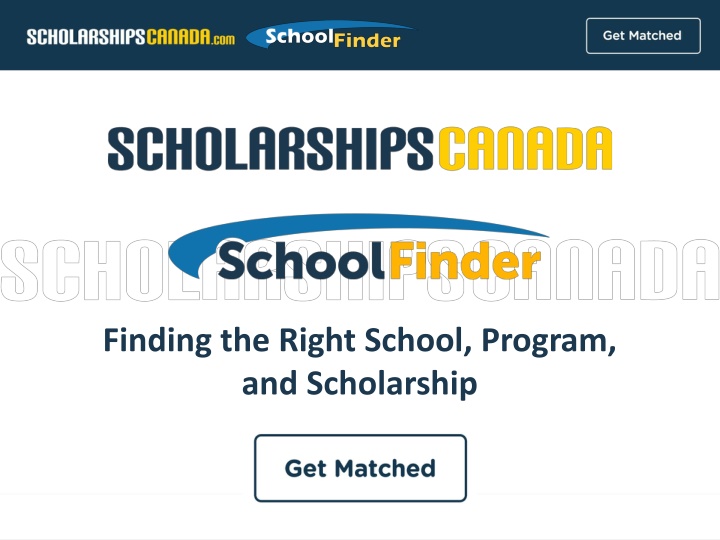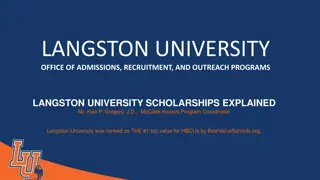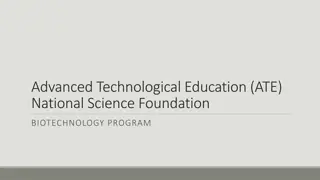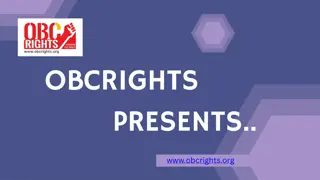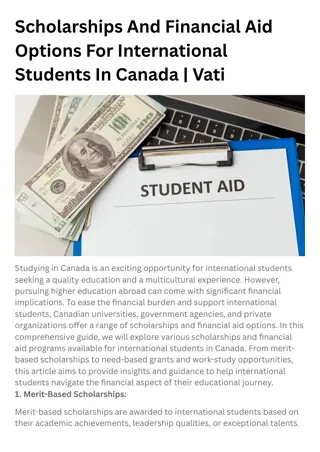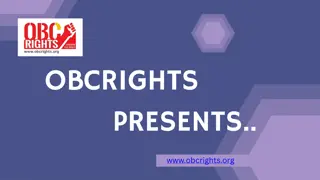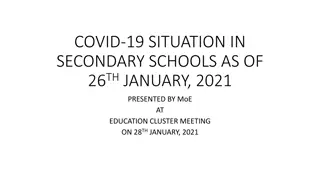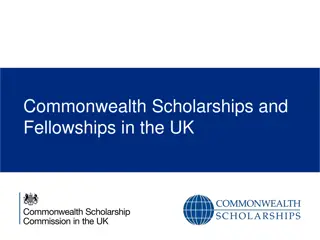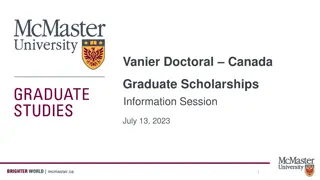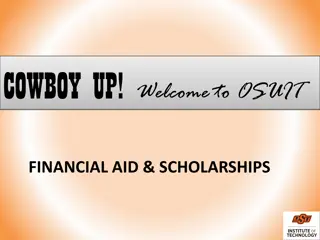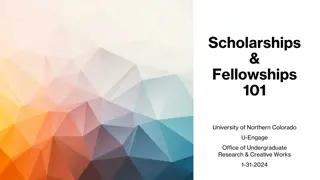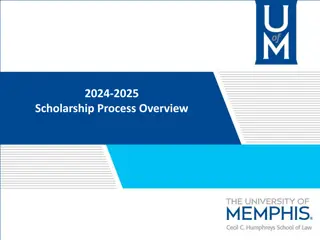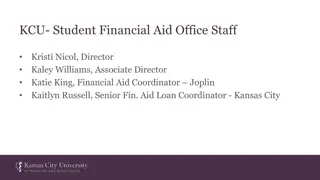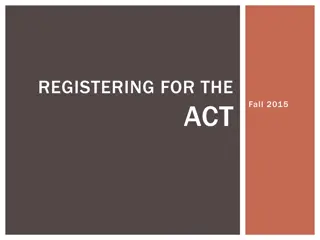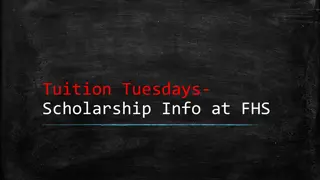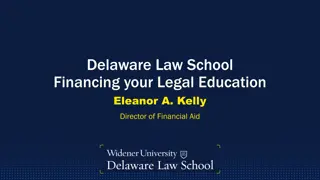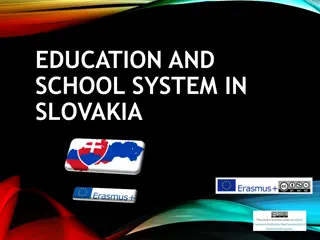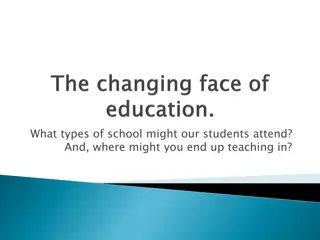Discovering the Right Path to Education: Schools, Programs, and Scholarships
Dive into the world of education with valuable insights on choosing the right school, selecting appropriate programs, and exploring scholarship opportunities. Learn about different types of schools, programs, and definitions to enhance your educational journey. Uncover the benefits of higher education beyond monetary value and utilize resources like a career quiz to guide your path. Empower yourself with knowledge to make informed decisions on your educational pursuits.
Download Presentation

Please find below an Image/Link to download the presentation.
The content on the website is provided AS IS for your information and personal use only. It may not be sold, licensed, or shared on other websites without obtaining consent from the author.If you encounter any issues during the download, it is possible that the publisher has removed the file from their server.
You are allowed to download the files provided on this website for personal or commercial use, subject to the condition that they are used lawfully. All files are the property of their respective owners.
The content on the website is provided AS IS for your information and personal use only. It may not be sold, licensed, or shared on other websites without obtaining consent from the author.
E N D
Presentation Transcript
Finding the Right School, Program, and Scholarship
My name is Logan Bright and Im the Managing Editor at SchoolFinder.com and ScholarshipsCanada.com. After high school, I got an advanced technical diploma in film production from Niagara College and worked as a video editor for several years. Still, I always wanted to make my living with words, so I earned an honours BA in linguistics, writing, and rhetoric, from the University of Toronto. Talk about tuition fees!
Getting an education is about more than money Graduates of higher education are more environmentally conscious, have healthier habits, and have a higher level of civic participation. In short, higher education institutions prepare individuals not only by providing them with adequate and relevant job skills, but also by preparing them to be active members of their communities and societies. Source: https://www.worldbank.org/en/topic/tertiaryeducation
Definitions: Schools University: big institution, usually focused on bachelor degrees, often called college in the United States. Typically publicly funded College: smaller schools, usually focused on diplomas and trades certificates, often called community college in the United States. Publicly funded Career college: small schools, may work with a larger college or university as a partner. Focused on short programs for career readiness. Privately funded Grad school: part of a university, focused on professional programs
Definitions: Programs Undergraduate: programs for students out of high school. Usually diploma or bachelor level Graduate degree: further education for students who have completed undergrad, at the master or even PhD level. Think law school, med school, teacher s college Co-op / internship: work-integrated learning; get paid to work while you study and develop your career skills Apprenticeship: a stepping stone to education in the skilled trades. Think plumber, electrician, welder
The Career Quiz The Career Quiz was created by Rodger Harp, an accomplished career counsellor who has helped thousands of students across Canada with his books on careers and life skills. https://www.schoolfinder.com/Careers/CareerQuiz/CareerQuiz.aspx
Your matching schools Get a list of schools that fit you: Check profiles Tick the box & submit to request info Schools will reach out to you directly https://www.schoolfinder.com/MyAccount/MyRequest.aspx
Your matching programs Find a list of programs to explore: Sort by important factors Check out each program listing separately Choose programs to compare directly Save your faves! https://www.schoolfinder.com/MyAccount/MyMatchingProgram.aspx
Updating your profile By editing your profile, you can explore alternative results. You may find something you didn t expect! Try: Program field (favouring general fields) Location of study Degree level of interest https://www.schoolfinder.com/v2Signin/BasicInformation.aspx?Action=U pdate
Events & Chatting with Students Connect with the schools that interest you via events, either online or in-person. Take live or virtual campus tours, too! Find events and tours on the SchoolFinder events page or the school s website. https://www.schoolfinder.com/Events/Index.aspx https://www.schoolfinder.com/Schools/Virtual-Tours.aspx Go even further by contacting current students to learn about their experiences. Tools like Unibuddy let you connect easily, just like social media without sharing private information. https://www.schoolfinder.com/Schools/Chat-With-Students.aspx
Study and Go Abroad / SchoolFinder Fairs Come out to SAGA / SFF this fall! Four cities across Canada: Calgary, Sept 27 Vancouver, Sept 28 Ottawa, Sept 30 Toronto, Oct 1 A logo for a college Description automatically generated
Definitions: Scholarships Scholarship: related to grades and accomplishments. Can also be used as a generic term for all sorts of school financing supports. May be renewable Bursary: based on financial need. Sometimes renewable Award: based on accomplishments; sometimes academic, otherwise extra-curricular. Can be used as a generic term, too. Often not renewable Grant: one-time support for grades or accomplishments. Generally not renewable
Scholarship Myths
Myth #1 I don t have the marks! 85% of awards do not require an academic average on ScholarshipsCanada.com!
Myth #2 There is a lot of competition! 59% of scholarship administrators would like more applications. 3% of scholarships received no applications at all!
Myth #3 Only schools give scholarships! 10,000+ scholarships are awarded by non-educational administrators (corporations, associations, trade unions, religious organizations, etc.)
Myth #4 Scholarship deadlines are only in the spring! Scholarship, bursary and contest deadlines are throughout the year!
Myth #5 I m not in financial need! Only 36% of scholarships require you to be in financial need on ScholarshipsCanada.com!
Remember Scholarships, bursaries and contests are often not based on marks. Most administrators want more applicants More than just schools award scholarships. Deadlines are year round. You don t need to be in financial need. You can t win if you don t apply! There is an award for you.
Theres a scholarship for YOU
Featured scholarships Fastest way to find new awards. Often open to a wide range of students, and may include things like surveys and diary opportunities not standard scholarships, but ways for students to earn some extra cash. New featured scholarships get posted often! https://www.scholarshipscanada.com/Scholarships/FeaturedScholarships .aspx
Where to Start? Before you begin your search for scholarships, take some time to think about these factors: Field of Study (the program you re interested or currently in) Year of Study (entrance, first, second, third, fourth, final year, graduate) Activities (sports, religious, academics, leadership, community involvement, volunteer experience, etc.) Academic Average (your most recent grades)
Where to Start? Other factors to consider: Heritage (Indigenous, Chinese, Polish, etc.) Affiliation (companies, religious groups, unions, and associations, that you or your family are affiliated with) Personal Circumstances (amputee, brain injury, foster child, parent, etc.) Financial Need (pertains to your income; check with the scholarship administrator for more details) Location (where you live and go to school)
Manage your Subscriptions Don t forget to subscribe to receive scholarship deadline alerts!
Finding Scholarships: General Tips Get motivated: You have to be willing to put in the time! Invest your time: Try to dedicate a few hours per week ScholarshipsCanada is your BFF: Keep your profile updated and sign up for scholarship deadline alerts Understand the requirements: Don t apply for awards you re not eligible for. Have questions? Contact the award administrator
Finding Scholarships: General Tips Apply to the smaller awards: There is a lot less competition! Be prepared: Have reference letters, personal statements, cover letters or resum s on hand Don t give up: Don t be discouraged if you don t win the first three, five or ten awards that you apply for
Boilerplate Documents Create a boilerplate: Basic template for your documents Resum (one page is all you need) Personal statement (about 500 words) References (two is a good number; one academic and one personal) Customize these docs for each award you apply to!
Personal statement basics 500 word personal statement. When in doubt, cover: Who you are (what s your background & history; how do you define yourself?) What your goals are (what do you want to achieve? Where are you headed next?) What receiving the award means to you (how will this scholarship impact you?) What receiving the award means to your community (how will your win affect others around you?)
When should I apply? After accepting an offer of admission; most scholarships will expect you to be enrolled, or at least accepted, to a college or university. Once you've accepted an offer of admission, you can start applying for most awards. Are there awards for people in the trades? Yes! Though they're not as common. Look for awards targeted at people in technology, construction, and other trades, apprentices, and awards aimed at the "diploma" or "certificate" level to find scholarships open to tradespeople.
How many scholarships can I apply to and receive? As many as you like! There's no maximum for total scholarships received. Though specific organizations may specify that you can only receive one of their awards, that won't affect other organizations or scholarship admins. What are the highest value scholarships? Canada has relatively few "full ride" scholarships, though they do exist. Some of the biggest awards in the country include the Loran Scholarships, the TD Scholarships for Community Leaders, and the Schulich Leader Scholarships.
Can I defer a scholarship if I need to? In some cases, yes, scholarship admins will let you defer the award. This is hit and miss: really depends on the admin. When in doubt, reach out. Are there scholarships for international students? Yes, though they re less common than awards for domestic students (citizens and permanent residents). They re often rather competitive, and typically focus more on grades than the other achievements we ve discussed. Schools outside Canada will also award scholarships for internationals, but the same rules apply!
Scholarship Next Steps In grade 11? Build your resum volunteer (meaning, not hours!), leadership, community service, grades In grade 12? Apply for schools and awards! entrance awards, awards for first-years and those just out of high school In college/uni? Get involved with clubs and associations & check w/ financial aid office find awards for second-years and above, department-nominated awards
Study and Go Abroad / SchoolFinder Fairs Come out to SAGA / SFF this fall! Four cities across Canada: Calgary, Sept 27 Vancouver, Sept 28 Ottawa, Sept 30 Toronto, Oct 1 A logo for a college Description automatically generated
Q&A + Thank you! We wish you the best of luck in your search! Be sure to check out the next session! And we hope to see you at a Study and Go Abroad / SchoolFinder Fair! (And visit us on social!) @ScholarshipsCA @ScholarshipsCanada @ScholarshipsCanada /ScholarshipsCanada 35
